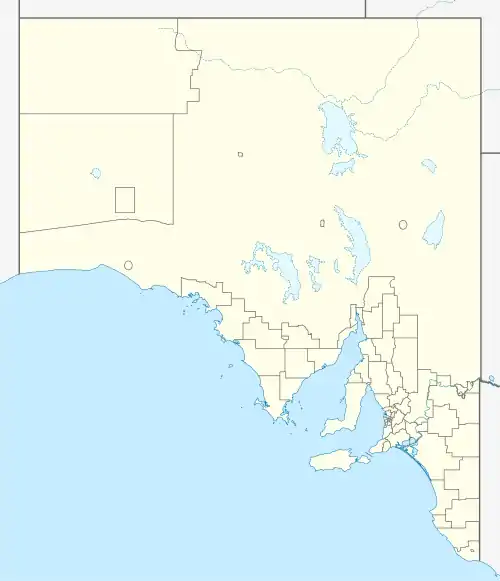Darke Peak
Darke Peak (formerly Carappee) is a small agricultural town located in central Eyre Peninsula, South Australia. The town is the population centre for the surrounding agricultural district and has become a minor historical tourist town. It is situated on Barngarla lands. The J. C. Darke Memorial and Grave, commemorating early European explorer John Charles Darke, is located near the township and is located on the South Australian Heritage Register.[9]
| Darke Peak South Australia | |||||||||||||||
|---|---|---|---|---|---|---|---|---|---|---|---|---|---|---|---|
 Darke Peak | |||||||||||||||
| Coordinates | 33.468410°S 136.200590°E[1] | ||||||||||||||
| Population | 175 (2006 census)[2] | ||||||||||||||
| Established | 4 June 1914 (town) 23 December 1998 (locality)[3][4] | ||||||||||||||
| Postcode(s) | 5633 | ||||||||||||||
| Elevation | 247 m (810 ft) | ||||||||||||||
| Time zone | ACST (UTC+9:30) | ||||||||||||||
| • Summer (DST) | ACST (UTC+10:30) | ||||||||||||||
| Location |
| ||||||||||||||
| LGA(s) | District Council of Cleve[1] | ||||||||||||||
| Region | Eyre Western[5] | ||||||||||||||
| County | Jervois[1] | ||||||||||||||
| State electorate(s) | Flinders[6] | ||||||||||||||
| Federal division(s) | Grey[7] | ||||||||||||||
| |||||||||||||||
| |||||||||||||||
| Footnotes | Adjoining localities[1] | ||||||||||||||
The town has a number of limited facilities, including accommodation, grocery and fuel supplies. At the 2006 census, Darke Peak had a population of 175.[2]
History
The area was in the general vicinity of Nauo and Barngarla land.
The town takes its name from the explorer John Charles Darke, who was injured in a spear attack by Indigenous people while he was climbing nearby Waddikee Rock on 24 October 1844. Waddikee Rock is a sacred site of the Barngarla people.[10] He died the next day and was buried at the foot of the Rock.[11] Governor Grey expressed a wish that some landform in the region of the grave should be named to honour him. In 1865 surveyor Thomas Evans who was performing a trigonometrical survey of the Gawler Ranges and named the 1,564 ft (477 m) high mount, 'Darke's Peak'.[12]
In 1909, another surveyor, W.G. Evans, reported that he had found bones in a grave and was satisfied they were the remains of Darke. Darke's grave and monument are located on the western side of the range, still standing as a memorial to the first European who explored this area. The memorial was erected by the SA Government in 1910.[11]
The township of Darke Peak was originally proclaimed Carappee in 1914. The town was renamed in 1940 after the peak that bears John Charles Darke's name as further honour to the explorer. A school opened in the town in 1917.[13]
Darke Peak includes Darke Range, Caralue Bluff, Carappee Hill Conservation Park and Carappee Hill in the surrounding area, with Carappee Hill known for being the highest exposed granite rock mass on Eyre Peninsula.[14]
Economy
Darke Peak is predominantly a farming community, with surrounding areas producing cereal crops, with sheep also produced as a backup for when the region experiences poor rainfall. Local farmers have been farming the area for a number of generations, predating the establishment of the town. The farming areas are very similar to other towns across the central Eyre Peninsula, growing much the same crops under similar climate conditions.[15]
Tourism is a minor component of the towns economy, with Darke's Grave, The Darke Range and various tourist drives the main attractions. Tourist information is present at The Peak Stop shelter.
Facilities
Darke Peak has a hotel which dates back to the early days of the settlement and offers accommodation and meals.
Sporting facilities in the town include tennis and netball courts, oval, playground, swimming pool and a golf course, with some sports teams competing in local leagues.[15]
Governance
Darke Peak is located in the local government area of District Council of Cleve, the State Electoral district of Flinders and the Federal Division of Grey.[7][6][1]
References
- "Search result(s) for Darke Peak, LOCB (Record No. SA0017925) with the following layers being selected – "Suburbs and Localities" and "Place names (gazetteer)"". Property Location Browser. Government of South Australia. Archived from the original on 12 October 2016. Retrieved 7 December 2016.
- Australian Bureau of Statistics (25 October 2007). "Darke Peak (State Suburb)". 2006 Census QuickStats. Retrieved 30 July 2011.
- Bice, John G. (4 June 1914). "Town of Carrappee" (PDF). The South Australian Government Gazette. Government of South Australia. p. 1222. Retrieved 25 June 2019.
- Kentish, P.M. (23 December 1998). "GEOGRAPHICAL NAMES ACT 1991 Notice to Assign Boundaries and Names to Places (within the District Council of Cleve)" (PDF). The South Australian Government Gazette. Government of South Australia. p. 2009. Retrieved 25 June 2019.
- "Eyre Western SA Government region" (PDF). The Government of South Australia. Retrieved 10 October 2014.
- "District of Flinders Background Profile". Electoral Commission SA. Retrieved 9 September 2015.
- "Federal electoral division of Grey" (PDF). Australian Electoral Commission. Retrieved 24 July 2015.
- "Monthly climate statistics: Summary statistics CLEVE (nearest weather station)". Commonwealth of Australia, Bureau of Meteorology. Retrieved 26 June 2019.
- "JC Darke Memorial & Grave". South Australian Heritage Register. Department of Environment, Water and Natural Resources. Retrieved 13 February 2016.
- http://www.austlii.edu.au/cgi-bin/viewdoc/au/cases/cth/FCA/2015/9.html
- State Library of South Australia Manning Index, Darke Peak, archived from the original on 14 June 2007, retrieved 2007-06-13
- District Council of Cleve, Darke Peak History, archived from the original on 29 August 2007, retrieved 13 June 2007
- "NEW TOWN NAMES APPROVED". The Chronicle. Vol. LXXXIII, no. 4, 728. South Australia. 1 August 1940. p. 13. Retrieved 31 August 2016 – via National Library of Australia.
- District Council of Cleve, Darke Peak Recreation, archived from the original on 29 August 2007, retrieved 13 June 2007
- Tourism Eyre Peninsula, Darke Peak, retrieved 13 June 2007